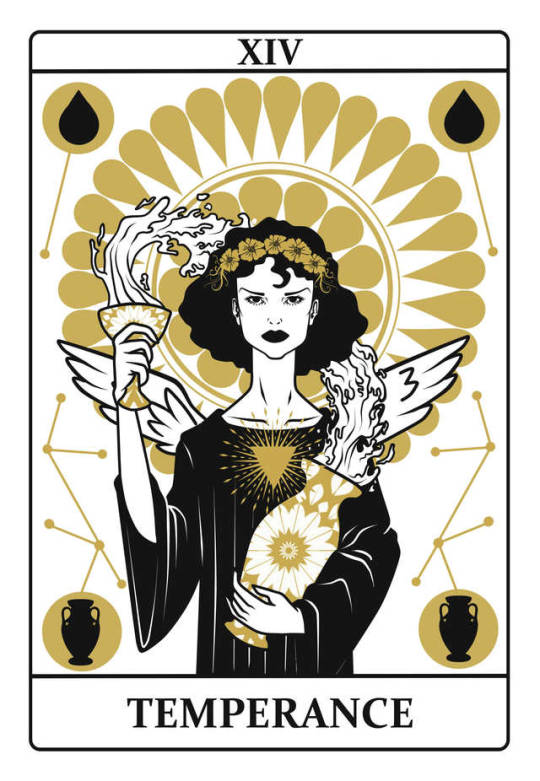Text
Im reblogging this here because this was a post I made when I first felt Sophrosyne calling to me, so I want it for prosperity's sake!
(I'll have to hunt thru my journals to see if I have this fully documented somewhere!)
Spooky Tarot Reading
With all my religious doubts I kept thinking about tarot and laughing to myself because I have had no issue with that. But I don’t always see it as some magical thing with energy. It helps me think about things in ways I otherwise wouldn’t.
Buuuut then I sometimes have spooky readings. I had one tonight so I had share! I came across a spread for learning about your spirit guide. I’ve never given a thought to spirit guides and I’m still not positive that’s the word I should use, but I thought it’d be a fun experiment. I did the spread with sincerity but honestly wasn’t expecting much. I prayed like I do before hand, and then I did the spread. Now, when I’m asking questions like these I assume a reading that doesn’t make sense is a nonanswer.
These were my cards:
Who are you/what is your personality? Temperance. First off I’ve gotten this card in my last three readings and every time it’s powerful but to pull this one again for my first card was a real oh shit moment.
How can you help me on my spiritual path? The Lovers. So at first I thought, cool, gunna help me with self love or my relationship. But I use a nontraditional tarot deck so I stick to the meanings given by the creator. And this card? The actual description BLEW ME AWAY. “After the structure and procedure of the Emporer and Hierophant, the Lovers depict joyful dance exalting in self-expression. No belief system is perfect, and after becoming the dutiful student it is now your right and privilege to question the truth of your beliefs” OKAY. Given how Ive been feeling lately this was absolutely creepy. It’s stuff like this when I WTF because I don’t usually have these… Experiences.
The readimg was five cards total but to keep this short - the last card I’ll talk about is a funny one.
What are your spiritual strengths? Turned over my card to reveal… Strength. I audibly chuckled. That’s like yeah, I’m strong, okay next question?? It’s hilarious to me.
So tldr tarot is spooky sometimes even for me, the skeptic.
8 notes
·
View notes
Text
10 simple ways to honour minor deities
when you’re a pagan, sometimes you find yourself drawn to minor deities who had no historical following or have very little written information on them. this list, which other people can add on to if they want, will give a few different ways to honour, work with, or worship them! many of these are based around upg, so please remember that while you may honour a god a certain way, their other followers may not!
worshipping minor gods can be kind of a gamble, so if you’re not ready to go without a structure then maybe working with minor gods isn’t for you.. you have to be able to be flexible and creative with your devotion!
1. talk to them directly via divination, godphone, etc. no better way to learn than from the source!
2. take their known aspects and stories and work them into your worship (eos is the goddess of dawn, sunrises tend to be pink, so my devotional tag for her is full of pink things! i also stay up to see the sunrise with her sometimes)
3. expanding on the last point, utilise upg! is there something you associate with them that has seemingly no historical basis? incorporate it into your worship! (eos + pink, laverna + gold, bodb dearg + red duh)
4. make art for them! poetry, paintings, drawings, collages, anything! this doesn’t differ much from how you would honour “major” deities, but it’s a good way to honour minor deities regardless.
5. if they have stories that you can find easily, read those! rewrite them! draw them! interpret them to fit how your god appears to you! study them!
6. find other people who follow your god. this can be difficult, but they’re definitely out there! if you really can’t find anyone, looking for non-pagan content of them may satiate your needs just as well, and maybe it’ll inspire you to make your own!
7. research the culture they come from! you should really do this with all your gods, minor or major, as deities and their cultures are often inseparable, but it can help extra with minor deities. use rituals and things along those lines for other gods as a base and spin it to fit your god (all while being respectful to the other gods of course)
8. dedicate activities to them, even if said activities have nothing to do with their domains. washing your face, cleaning your room, making food, etc!
9. meditate for/with them, invoke them in spells if you practice witchcraft, create sigils related to them!
10. just… talk about them! spread the word about their presence (graciously of course, don’t evangelise or force people to listen to you)! tell their stories, spew about your love for them!
it can be hard working with gods when you have so little information to go off of, but it’s not impossible. good luck!
482 notes
·
View notes
Text
Sophrosyne’s Family
This list is compiled from genealogies in Hesiod’s Theogony and the Hyginus Preface. In the Hyginus Preface, Sophrosyne is listed as a daughter of Nyx and Erebos, so from that any children of Nyx or of Nyx and Erebos in the Theogony are considered siblings of Sophrosyne. The only one that stands out is Hekate, since Nyx is listed as her mother in one small fragment which I cited below. That’s kind of a small source, and conflicts with the Theogony itself but I find it interesting enough to include. I didn’t separate each one by source but I got this info from theoi.com and other sources when they didn’t have descriptions of the gods/daimones.
The Hyginus Preface might be a questionable source, especially in context of reviving ancient Greek religion. It’s written by Gaius Julius Hyginus, a latin author who lived from 64 BC – AD 17. For full context, here’s a description from Wikipedia of the work:
Fabulae consists of some three hundred very brief and plainly, even crudely told myths and celestial genealogies,[2] made by an author who was characterized by his modern editor, H. J. Rose, as adulescentem imperitum, semidoctum, stultum—"an ignorant youth, semi-learned, stupid"—but valuable for the use made of works of Greek writers of tragedy that are now lost. Arthur L. Keith, reviewing H. J. Rose's edition (1934) of Hygini Fabulae,[3] wondered "at the caprices of Fortune who has allowed many of the plays of an Aeschylus, the larger portion of Livy's histories, and other priceless treasures to perish, while this school-boy's exercise has survived to become the pabulum of scholarly effort." Hyginus' compilation represents in primitive form what every educated Roman in the age of the Antonines was expected to know of Greek myth, at the simplest level. The Fabulae are a mine of information today, when so many more nuanced versions of the myths have been lost.
Even though it would be absolutely questionable and not a valid source from a reconstructed perspective, it’s the only source that gives any genealogy for, and therefore a kind of personification of, Sophrosyne, so I choose to use it as my guide. Acknowledging it’s possible issues, it’s clear it was documenting what was already widely known, so it’s possible there were other texts and even myths involving Sophrosyne that are lost to us now.
With the sources and explanation out of the way, here’s the family list:
Grandparent:
Khaos - Primordial God at the dawn of creation (gender-neutral)
Parents:
Nyx - Primordial Goddess of Night
Erebos - Primordial God of darkness
Either half siblings from Nyx of full siblings:
Moros - Daimon of doom
Ker/Keres - Daimon(es) of violent or cruel death
Thanatos - Daimon of non-violent death
Hypnos - Daimon of sleep
The Oneiroi - Daimones of dreams - possibly led by Morpheus
Momos - Daimon of mockery, blame, ridicule, scorn, complaint, and harsh criticism
Oizys - Daimona of misery and woe
Hesperides - Goddess-nymphs of evening and the golden light of sunsets
The Moirai - The fates: Klotho, Lakhesis, Atropos
Nemesis - Goddess of indignation against, and retribution for, evil deeds and undeserved good fortune. (Note from Theoi: Nemesis directed human affairs in such a way as to maintain equilibrium. Her name means she who distributes or deals out).
Apate - Daimona of deceit, deception, guile, and fraud
Philotes - Daimona of friendship and affection, possibly also of sexual intercourse
Geras - Daimon of old age
Eris - Goddess or Daimona of strife, discord, contention and rivalry
Hekate (from Bacchylides, Fragment 1B) - Goddess of Magic, witchcraft, the night, the moon, ghosts, and necromany
Full Siblings of Nyx and Erebos:
Aither - primordial god of light and the bright, blue ether of the heavens
Hemera - Primordial goddess of the day
Eros - primordial god of procreation
Epiphron - Daimon of prudence, shrewdness, careful consideration and sagacity
Porphyrion - King of the Thracian Giants
Epaphos - Herodotus puts them in relation to the Egyption bull-deity Apis, unable to find other info
Hybris - Goddess of Daimona of insolence, hubris, violence, reckless pride, arrogance, and outrageous behavior
Euphrosyne - Kharites (charity) goddess of good cheer, mirth, merriment and joy
Eleos - Goddess or Daimona of mercy, pity and compassion
Styx - Goddess of the underworld river Styx, eldest of the Okeanides - OR - Daemon of hatred
3 notes
·
View notes
Text
Ugh, I've finished interpreting my 18 card tarot spread to learn more about Sophrosyne and I feel so mentally drained. It was rewarding but difficult. I learned a looot. I have to do some follow ups, to clarify a few things but some interesting things I learned:
She absolutely does have a connection to Themis
She has some connection with Zeus, takes influence from him. I find this awesome considering my original association of her with Zeus, so I wasn't entirely wrong.
She maybe has a connection with Persephone. I have no idea how. I gotta follow up for more info on this one for SURE. Spit balling, Persephone does keep balance between her Husband and her Mother, Winter and the Summer, so it's not to surprising.
I'd really like to know whether she takes residence in olympus or the underworld. Nyx and many of her children are connected to the underworld, but is Sophrosyne? Maybe she's like Persephone and goes between them? No freaking clue and I think that'd be hard to figure out with divination...
2 notes
·
View notes
Text
The Gods have many names and domains, Apollon can be the harmonious lyre-player, the deliverer of Zeus’ designs through divination or the ever-scary plaguebringer who will smite mortals with sickness. The Gods are many, they take many roles and are as diverse as the Cosmos is.
76 notes
·
View notes
Text
When I first met Sophrosyne, I'll admit I hadn't done enough research. I thought she was calling me, but I knew she wasn't treated as a goddess and I ran off to come up with my own ideas.
And I made some bad UPG...
I am particularly devoted to Zeus Cosmetes, the orderer, and Athena, so I decided to place Sophrosyne as a daughter specifically of Zeus Cosmetes and sister to Athena to fit her into my worship. I wanted to worship her with others I related to her and it was the best I could come up with.
Boy was I wrong. I'm not sure what had blinded my eyes in the past, quite literally, to the fact that Sophrosyne is said to be the daughter of Nyx and Erebus (Source: Hyginus Preface) . And now that I'm getting to know her in that proper context, everything is lining up and making sense and feels RIGHT!
Now I know why it never felt right before. I was completely ignoring her real family.
4 notes
·
View notes
Text
Sophrosyne's family
Symbols of Sophrosyne
Post Ideas
Sophrosyne's verifiable lore - what little there is of it!
Sophrosyne and Themis - commonalities and differences (UPG)
Sophrosyne's influence - Continentia, Cardinal Virtue of Temperance (mostly verifiable)
Sophrosyne as the Temperance Tarot Card (UPG/history)
Sophrosyne's connection with Athena and Hermes from the Odyssey (possibly verifiable, more research needed)
Philosophy and Sophrosyne
2 notes
·
View notes
Text
What an amazing post!! Thank you so much for this.
Thus one of the biggest keys to Sophrosyne is moderation. Nothing in excess says one of the Delphic Maxims, not even self-control and self-discipline.
Also this makes me want to explore the relationship between Sophrosyne and Dionysus. So often he's seen as a chaotic God but in this instance he's the one asserting balance!
Hellenic Polytheism 101 Transcripts: Pillar of Hellenic Polytheism Sophrosyne
Hello and welcome to today’s episode of Hellenic Polytheism 101, where we will be moving onto to the next pillar of Hellenic Polytheism: Sophrosyne, which is, essentially, moderation, prudence, self-control, self-discipline, or temperance based upon thorough self-examination. Since we are coming up on a holiday season in the US, this seems like the perfect time to focus on Sophrosyne, and to remember it’s opposite, hubris, and how to avoid it. It is also important to remember that even in Ancient Greece, it was well understood that Sophrosyne could be taken too far, something we also understand still today.
“Earth shaker, you would not consider me sophrosyne if I were to fight with you for the sake of wretched mortals” Apollo says this to Poseidon in the Illiad, as Homer brings us a look at what Sophrosyne would mean to the same deity who brings us the Delphic Maxims, such as know know thyself, know by learning, exercise prudence, praise virtue, nothing in excess, know who is the judge, keep secret what should be kept secret, take sensible risks, be well behaved, be self disciplined, be sensible. This is not the only example in Homer’s work of Sophrosyne. In fact, there are a really a lot of them. I would definitely suggest you read both of them and look closely for examples of sophrosyne. Homer was very sensitive to the need for Sophrosyne in society and in an individual. On an individual level, sophrosyne prevented people form getting into serious trouble, both with themselves and on a religious level. After all, someone exercising sophrosyne would be very unlikely to become a spider after being cursed by Athena, right? On a modern level, someone exercising sophrosyne is less likely to face personal problems as well. You won’t wind up drinking to excess and getting into a car accident. You won’t find yourself challenging someone better than you to a fight. You won’t find yourself taking on more tasks than you can manage. You won’t find yourself spending more money than you can spare on things you don’t need. By exercising sophrosyne you can avoid a lot of trouble. On a societal level, we should try to exercise that same self control and temperance. After all, there is no reason for any country to spend more than 56 countries combined on defense spending. There is no reason for a city to cut taxes and not invest in repairing roads or assisting those who need it the most. There is no reason for a group of friends to go out in the middle of a pandemic to a bar just to have a good time. We can bring the ideals of sophrosyne to our own lives and encourage others to do the same, through voting and talking to others and being an example.
When we do not practice sophrosyne, we tend to fall victim to hubris. For someone who has spent any sort of time practicing Hellenic polytheism, we should all know exactly how bad hubris is. We’ve all probably seen it or heard it online. Recently, there was a lot of talk of witches online cursing the moon, specifically aimed at making Artemis or Apollo angry. Now, in the end, it was revealed to be some big hoax, a lie they told to make other witches start saying things about how they could tell someone had hexed the moon because their own spells weren’t as effective. Then the original hexers could say “Ha! We told you witch craft and the gods weren’t real, see? These guys said they noticed a change but we didn’t do anything, so clearly they must be faking!” The whole ordeal was a perfect example of what could happen if people fell victim to hubris, and many more sensible folks online pointed out that it was hubris, believing anyone could have an affect on a deity by cursing the moon. We’ve all seen other examples of hubris. Hellenic polytheists who say that Artemis would never let a man worship her, or a straight woman, or a woman who has had sex with a man. People who gatekeep, projecting their personal bigotry onto the Theoi. We’ve all come across. Hopefully, most have us have rolled our eyes and ignored it.
Even in mythology, hubris is painted to be among the worst things a person can be. Niobe lost her sons and daughters to Artemis and Apollo after she bragged to Leto that she was better than Leto for having more children. Arachne, turned into a spider for daring to compare herself to Athena. Antigone’s father, who lost his son and his wife for believing that his life was higher than the law of the gods. Oedipus refuses to accept his own fate and wound up falling victim to it because of his hubris. Ajax, believing he was entitled to the armor of Achilles and being driven mad and eventually killing himself. Icarus, flying to close to the sun, too prideful to listen to his father’s warnings. Orestes taking it upon himself to avenge his father by killing his mother and being driven mad. Greek stories are teeming with examples of people who have fallen victim to hubris. In many of these stories, sophrosyne is pointed to as a virtue to aspire to strictly to avoid it’s opposite, hubris.
And yet, we can also take sophrosyne too far. For example, in the Bacchae, Pentheus holds himself as a champion of sophrosyne, as fails to understand that by being overly self-controlled and self-discplined and holding himself up as the model of sophrosyne, he ignores the moderation and temperance part. He tried to force everyone listen to him, to oppose the Bacchic rites, and, in the end, his obsession with only a part of sophrosyne causes his own death. The Ancient Greeks understood that there was such a thing as being too controlled. There was such a thing as a fatal exaggeration of one side of the many-sided virtue of sophrosyne. Thus one of the biggest keys to sophrosyne is moderation. Nothing in excess says one of the Delphic Maxims, not even self-control and self-discipline.
As we go through this holiday there a lot of ways you can apply sophrosyne to your life. One of the dangers of the holidays is becoming over-extended. For example, I have a large family. Like…..over 100 people kind of large. So large that we could probably fill a high school basketball stadium kind of large. It’s also got a lot of different branches. Mom’s side, which has dad and mom in separate houses. My ex-stepdad, whose family we still see. My dad and his family. My dad’s ex wife and her daughter and her kids, who I’m also close to. My girlfriend. My kids’ dad and his family. I always joke that we’ve got our own little 12 days of Christmas skit between grandpa jones, grandpa long, Uncle Cody, Uncle Andrew, my dad, his ex wife’s house, my girlfriend, the kids’ dad, his family, and we’ve still got to squeeze out time for our own holiday celebration too. Factor in the fact that, like most customer service based companies in the US, my job doesn’t allow us to take more than half of Christmas Eve and all of Christmas day off. Sure, we’ve got the Sunday before and after when I’m off as well, but that’s barely 3 days for 4 states and 10 places to visit. Factor in the budget for all those places and all those gifts, not to mention the drama that comes around when we decide where we’re having Thanksgiving at and you can understand why I bring up being overextended as a danger of the holiday season. Now, maybe that isn’t a problem for you. Maybe you become over extended by volunteering to work too many hours to help your more Christian friends have time off. Maybe you offer to do too much during Thanksgiving and wind up having to wake up at 5 am to get started on a meal that you can’t believe you promised to cook. Maybe during Halloween, you spend too much time focused on parties or trick-or-treating and realize that you would have had a much better time sitting at home, watching Halloweentown with a bowl of candy and some friends. Either way, we all tend to push ourselves too hard, especially once the holidays roll around and we start wanting to do everything so we can get every experience. We need to remember sophrosyne during this time. Exercise self-control and stay home when it’s something you want to do. Exercise self-discipline and avoid getting gifts when you can’t afford it, there is no shame in saying “Look, finances are strapped and I can’t manage more than X”. Exercise moderation and remember that you can’t actually do everything. Be prudent and accept the reality of whatever situation you are facing. Practice sophrosyne.
Thank you for listening to today’s episode of Hellenic Polytheism 101 where we discussed another one of the Pillars of Hellenic polytheism, Sophrosyne. Today, I relied on the Odyssey, The Illiad, Sophrosyne: Self Knowledge and Self-Restraint in Greek Literature by Helen North, A Period of Opposition to Sophrosyne In Greek Thought also by Helen North, Mythology of the Greeks by George Grote, and the Wikipedia entry for Sophrosyne. Remember, all links to the resources I used can be found on my tumblr at goddessdoeswitchery.tumblr.com, along with a transcript of today’s episode under the tag “Transcripts”. I look forward to speaking with you all again on October 18th, where we will be discussing Eusebia.
6 notes
·
View notes
Text
Why Reconstructionism matters
Sometimes people say that Reconstructionism is to use literary sources as dogma, that kills the spirituality of the people who follows it, that it’s arid, that kills off the innovation and creativity.
However, I strongly disagree. In fact, I think Reconstructionism is very important, not only for recons, but for the Pagan and Witchcraft community as a whole. Here, I’ll explain why:

#1: Innovation needs Information
Before the rising of Polytheism in Pagan community, the classical ritual which you saw everywhere was the wiccan-inspired ritual. The variations were actually very few. It was the same. exact. ritual. everywhere.
I remember that these people usually said to me that my practice was too “standardized”. LOL. These people who had the same ritual everywhere said to me that Reconstructionism didn’t let any innovation.
Just see the irony.
The fact is that innovation needs new sources to be real innovation. If you spread informations about only “eclecticism” you are not necessarily innovating, because this “eclecticism” is taking inspiration from somewhere, right?
And if you don’t know other sources because you’re dismissing them as “too much standardized” you are actually taking inspiration from the same pool of sources. So this “eclecticism” becomes more standardized than Reconstructionism.
We can see this with the rise of Polytheism. People at start refused this approach because “we don’t live in the past anymore, we have not to be limited by the past customs”. However, now that it’s an established reality we can see that Polytheism didn’t limit anything, on the contrary it increased the variety of the practice.
This is the first reason we need Reconstructionism: even if we are not Recons ourselves, it provides us new inspiration, an inspiration that eclecticism is not giving us anymore, now that even eclecticism became a standardized practice.

#2: UPG is perfectly compatible with Reconstructionism
To follow Reconstructionism doesn’t mean that our practice is detached from spirituality, that we are disconnected or separated from experience.
In fact, we just use the instrument, the practice of the past, but if we, with these instruments, receive informations from the Spiritual Realm that don’t collude with the worldview of the past, our information is still traditional, because it’s been obtained with traditional means.
This information is called UPG (Unverified Personal Gnosis) when it hasn’t been verified by ancient sources, SPG (Shared Personal Gnosis) when the same information has been received by a number of unrelated people, one arrived at independently of one another, and CG (Confirmed Gnosis) when substantiating evidence for an incidence of UPG or SPG has later been found in the lore of the past or in other ancient sources. This is also sometimes referred to as CPG (Confirmed Personal Gnosis).
So yes, UPG is perfectly compatible with Reconstructionism. The only “but…” is that, when you are talking about it, it’s better to differenciate it from the lore or other ancient sources, in order to mantain intellectual honesty, in order to help people not to think that your UPG is part of the lore.

#3: We need intellectual honesty in informing others
This point is connected with the other: when we are innovating traditions because of our inspiration or because of an UPG, we have the moral obligation to declare it.
We cannot say that our UPG or innovative practice is “very very ancient” when history says that’s not the case. If our tradition is valid we don’t need to describe it as ancient when it’s not.
This is important because the person that is approaching our informations for the first time has in mind an historically-attested practice, so we need to be honest with people, because people believe what we say to them. If we say them that our tradition is exactly like in the past and then they discover that it’s not so, that it’s been innovated and we didn’t tell them, they feel betrayed.
It makes more sense to be totally honest and say “it’s not ancient, but it’s valid”.
This because even if we do it with good intentions, even if we think that to call it “Real Authentic Tradition of the Past” is a good name for our tradition, it’s not. Because we aren’t dealing just with ourselves, we are dealing with other people’s feelings, emotions and above all with other people’s expectations.
We don’t have the right to betray other people’s expectations.
If you go to a restaurant and order a piece of red meat, and you receive a soy hamburger because the cook believes that “it’s healthier”, you feel offended because that is not what you asked for.
Just because you think that innovation is better, you can’t give other people different things than what they asked for, and masking them with the names of what they ordered is not intellectually honest.
We need to be intellectually honest and be very careful and cautious when we deal with other people’s expectations and feelings.

#4: Because forgotten Spirits and Gods deserve more attention in Pagan/Animistic/Witchcraft community
In Pagan, Animistic and Witchcraft commuity there is a certain group of Deities which is usually approached by practitioners. It’s a limited number: we can say, in fact, that in Pagan community we created a new pantheon with a very limited number of Gods in it.
However, there are many many Gods and Spirits’ names inside witch trials acts, inside folklore. Many names which are forgotten.
People died for these Spirits, and now we have forgotten them.
Pierina and Sibilla lost their life in 1390 for their love for Milady East (”Madonna Oriente”), Zuan delle Piatte did the same for the Apenninic Sybil, Herodias and the Lady of the Game (”Donna del Bon Zogo”), in Sicily people went under the inquisition for their relationship with the Donne di Fora (”Ladies from Outside”), and so on.
These are real people who really died or were tortured, and now? Now their efforts… where are their efforts?
Where are the offerings for Milady East, the Lady of the Game, the Ladies from Outside? Where are them?
There are none.
Nowdays, people have forgotten their names. Nowdays nobody is leaving offerings for them. Is it right? I don’t think so.
Reconstructionism, therefore, means to rediscover these names, it means to say that these people didn’t die in vain, that what they died for still lives.
That the Spirits they loved so much to go to their death will be remebered, that offerings will be leaved for them again, that what they left in this world can be reconstructed, can be rebuilded.
This is the main reason why Reconstructionism matters. Because we need to honor people who left the past on our hands. Because we need to restablish the cults of forgotten Gods and Spirits.
123 notes
·
View notes
Text
Post Ideas
Sophrosyne's verifiable lore - what little there is of it!
Sophrosyne and Themis - commonalities and differences (UPG)
Sophrosyne's influence - Continentia, Cardinal Virtue of Temperance (mostly verifiable)
Sophrosyne as the Temperance Tarot Card (UPG/history)
Sophrosyne's connection with Athena and Hermes from the Odyssey (possibly verifiable, more research needed)
Philosophy and Sophrosyne
2 notes
·
View notes
Photo

TAROT 14 - Temperance by Casimir Lee on ArtStation.
2K notes
·
View notes

